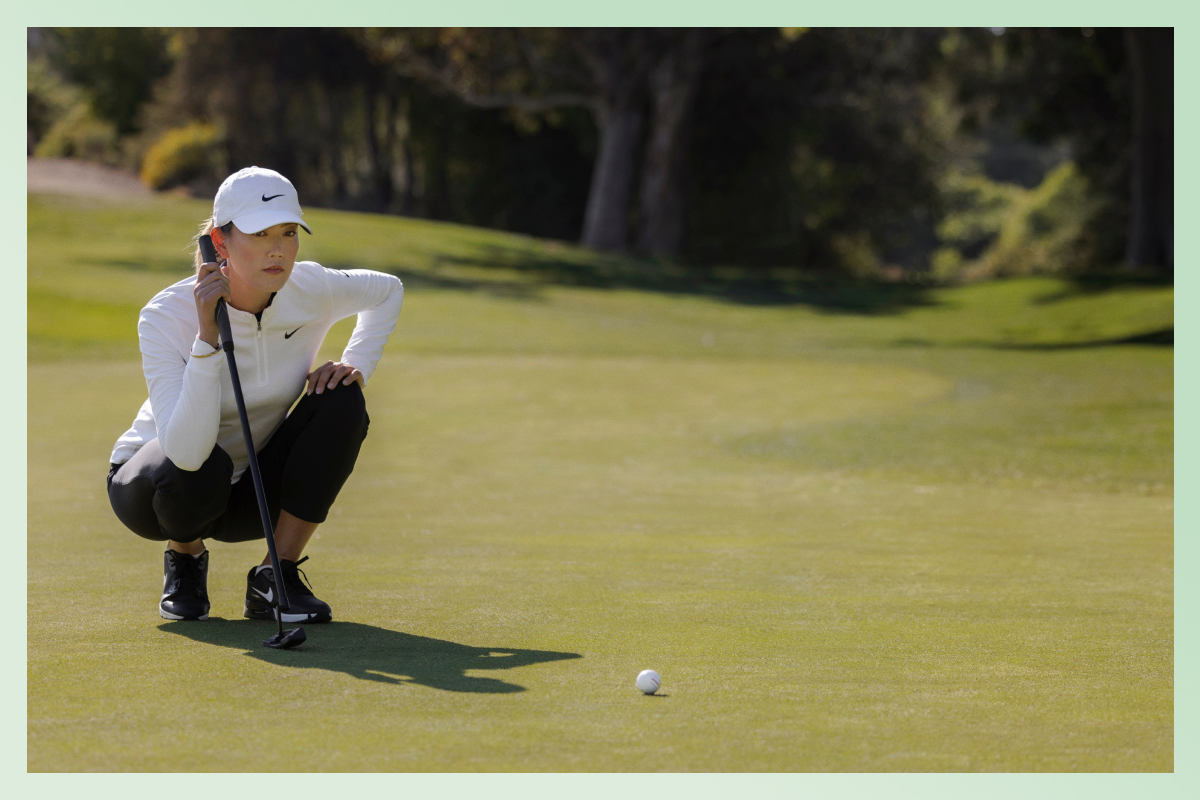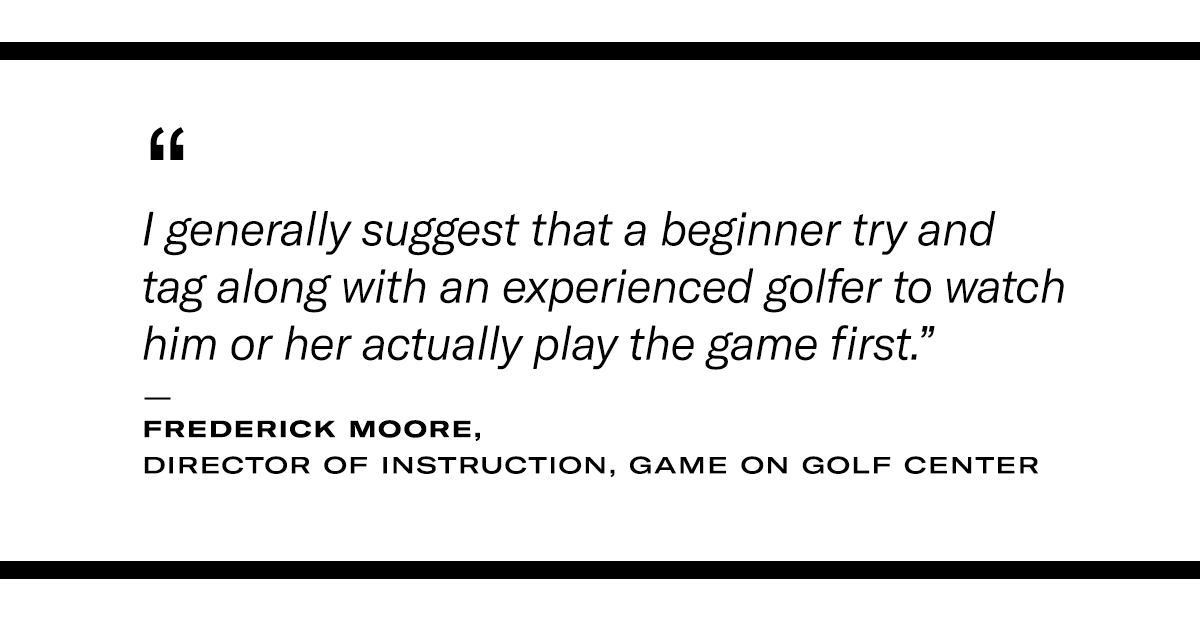Here’s how to break down the fundamentals and get your game up to par.

In a mid-pandemic era, new golfers flocked to the links in herds. In fact, 500,000 newbies joined the game in 2020 compared to 2019, the largest increase seen in the sport since 2003, according to a report by the National Golf Foundation. And while picking up golf is an effective way to stay active, it can also be frustrating.
You might see rapid improvement when you’re starting out and then—nothing. Here’s some advice from golf champion Michelle Wie West: Stick with it; the tide will turn.
“Everything comes in waves,” Wie West says. “Nothing is permanent. When you’re going through a low point, that’s not permanent, and when you’re going through highs, unfortunately, that’s not permanent either. You just have to learn to ride the waves and be grateful for every moment.”
While patience and tough skin are crucial, there are still a lot of functional basics to learn before you even step into a tee box. It’s important to start simple and break down the fundamentals, says Ali Gilbert, CSCS, a Titleist Performance Institute Level 3 Fitness Coach and Level 2 Power Coach based in Jupiter, Florida. Here, golf pros and experts share their top tips for beginner golfers who are new to the greens. Read on to give yourself the best shot at playing this game for life.
Best Tips for Beginner Golfers
1. Remember P.G.A: Posture, Grip, Alignment
It’s important for beginners to start by learning the fundamentals of golf like grip, stance, posture, and ball position, says Frederick Moore, PGA member and director of instruction at Game On Golf Center in White Plains, New York.
“When I teach a beginner, those letters stand for posture, grip, and alignment,” he says. “Those three items are a great start for any beginner to learn from day one.”
The best way to perfect these basics is to consider taking a lesson. “I believe that everyone needs to take lessons, but especially beginner golfers who have never touched a club or tried to learn how to swing the golf club correctly.”

2. Focus on Proper Form
While practice usually makes perfect, proper practice is essential for rookie golfers. Continuing to do the same incorrect movement over and over will only get you better at perfecting an incorrect movement pattern.
“I generally suggest that a beginner try and tag along with an experienced golfer to watch him or her actually play the game first,” says Moore. Developing your golf swing with sound fundamentals will help you excel quicker by acquiring a repeatable golf swing that you can trust.”
Moore also recommends a minimum of three to four hours of practice time at the driving range for every one hour of instruction to reinforce the basics. That way, you can lock in the proper movement patterns you picked up during the lesson.
3. Add Variety to Your Practice
“Golf is one of those sports that involves a lot of precision with biomechanics mastery,” says Gilbert, which is why many beginners find golf difficult to enjoy at first. But once everything starts clicking, that’s when the fun begins.
To form good habits, Moore recommends two types of practice: block practice and random practice. “Block practice is just working on your technique in front of a mirror or through the use of video,” he explains. “Random practice is hitting golf balls at various targets at various distances to get a feel for how far the ball goes and the effort involved with hitting it the desired distance.” Going slow in the beginning to allow the brain to learn the proper move is critical to forming muscle memory required to play well long term.

4. Work With What You Have, Upgrade Later
Don’t make the rookie mistake of spending a fortune on a new set of clubs before you ever even swing one. “Starting with a high-lofted iron—like a pitching wedge, an 8-iron, or a 9-iron—with a molded training grip is a great way to learn how to start hitting the golf ball,” says Moore. “Once you’ve learned the fundamentals, which generally takes about five lessons or so, I would suggest getting professionally fit for a set of irons and woods if golf is something you’ve committed to and plan on playing for an extended amount of time.”
Colored balls can also be helpful for beginners, as they’re easier to locate, especially in the rough, and a golf glove will help prevent blisters and allow you to maintain proper grip through your swing. But the most important tool you need when it comes to learning golf is patience. “Remember, golf is a skill game,” Moore says. Building those skills takes time and practice, but sticking with it will pay off over time.
5. Prioritize Strength Training
While Tiger Woods was one of the first to popularize strength training among golfers by mixing in weight room sessions with his time on the course, golf fitness has exploded in popularity since then.
“Players are showing up fitter and more resilient than ever,” says Gilbert. “Getting in two to three training sessions a week for golf fitness will make a big impact.”
No trainer? No problem. Tonal offers a holistic golf-specific program that includes workouts inspired by Wie West’s training, as well as expert tips, yoga and mobility for golfers, and meditation sessions. All of this can help you build both physical and mental strength and improve your mobility when you’re training off the course. “Plus you can implement so many of the important lifts like squats and deadlifts into Tonal programming, as well as the necessary cable exercises for core strength,” says Gilbert.
6. Start where you are
The easiest way to quit golf as a beginner is to set unrealistic expectations. If you’ve rarely or never played before, it’s unreasonable to expect to be good on day one. “Lower your expectations in the beginning, especially when you decide to go out on the golf course and try to score,” says Moore. “When expectations are high and skill level is low, that’s a recipe for a lot of frustration that could lead to giving up the game entirely, and we certainly don’t want that.”
Moore recommends seeking the help of a certified golf pro who can not only help you learn how to swing the golf club properly, but also play the game and acquire the necessary skill to be competent in all the shots including putting, chipping, pitching, bunker play, irons, driver and fairway wood shots. “Keep your chin up and try to play with a positive attitude,” he says. “Learn from your mistakes and enjoy the struggle of learning how to play this great game.”


